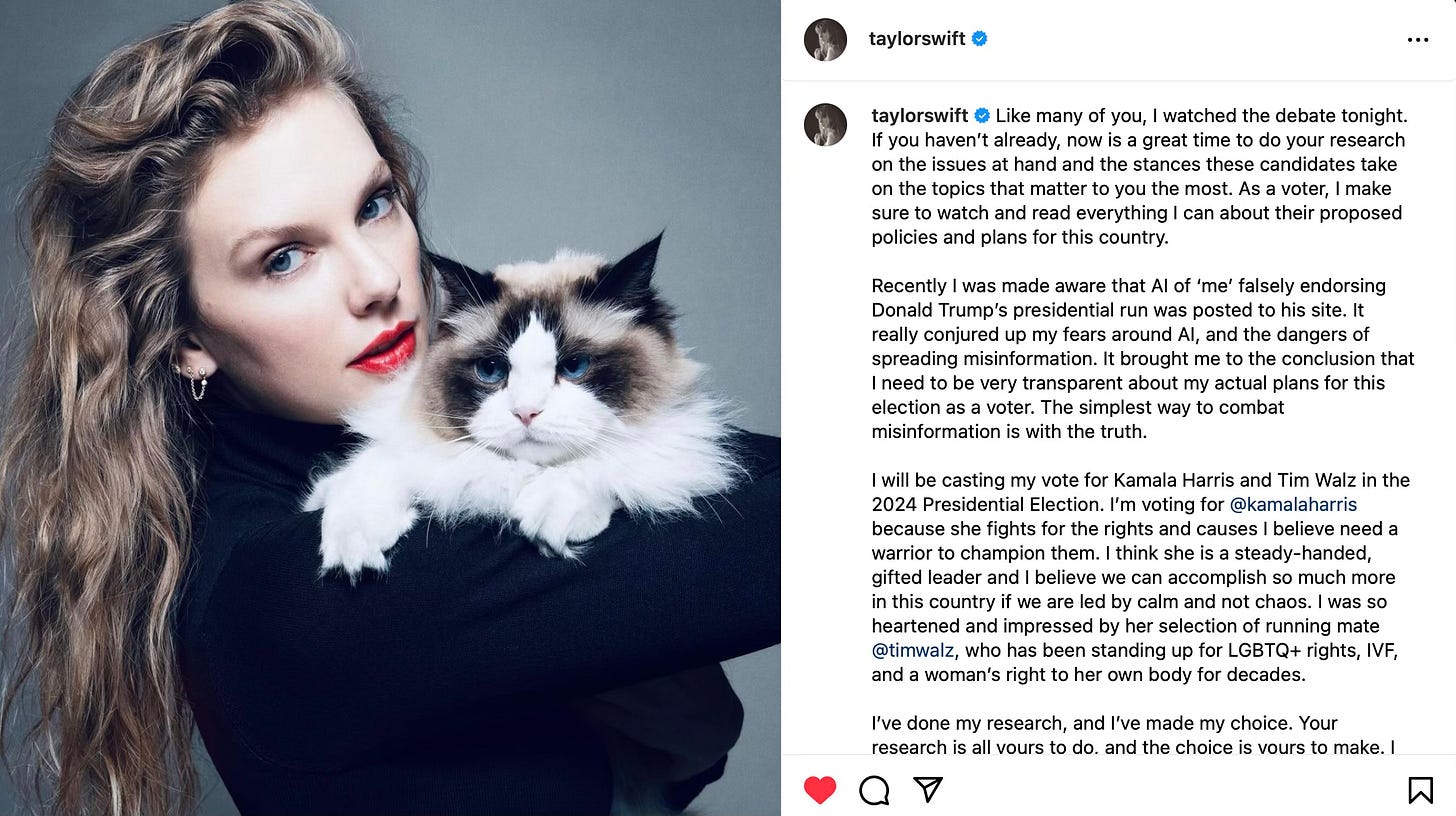
In recent days and weeks, much digital ink has been spilled over since Taylor Swift’s endorsement of Vice President Kamala Harris for president. While some chatter noted its potential consequences for the presidential horse race, most commentary dwelled on what her endorsement (and the deranged reaction to it) tells us about American society and politics at this particular moment.
For one author, Swift represents the “perfect bogeyman” for the Trump campaign and its coterie of chauvinistic online influencers. With her measured support for the vice president, another observes, she “might be the last living exponent of the Obama-era ideal of staying classy in the face of provocation.” According to yet another writer, she may even have broken former president Donald Trump’s already-addled and fame-obsessed brain.
And that’s just on The Atlantic’s website.
Entertaining as they may be, however, these largely ephemeral takes miss something essential about Swift’s political engagement: namely, that she keeps politics in perspective even as she actively involves herself in public life. It’s a way of thinking that recognizes the importance of politics, but also one that understands that politics remains just one of many important parts of life. But it’s also easy to miss; even commentators who see something “radical” in the “restrained” and “understated” language of Swift’s endorsement post tend to do so mainly in the context of the present political moment.
But Swift’s endorsement of Harris didn’t occur in a vacuum; it’s part of a healthy pattern of political engagement that’s in keeping with her previous interventions. Her tone and tenor haven’t changed all that much since her initial foray into electoral politics back in 2018. Indeed, Swift’s post endorsing Vice President Harris echoes her first: she says who she backs, gives her reasons for that support, and encourages her fans and followers to look into the candidates and register to vote. (Her Harris endorsement post drove a spike in traffic to the federal voter registration information page, for instance.) Swift will also make stray political comments in interviews or on social media platforms and urge audiences at live events like music award shows to vote, but otherwise she leaves it at that and gets on with her life.
Overall, it’s an approach that testifies to the truth that while politics may be important, it isn’t everything—and certainly isn’t who we are as individuals. Her political statements indicate she understands this reality and doesn’t feel compelled to constantly prove her ideological bona fides. They also demonstrate that she has much more respect for her audience than many professional political activists and social media screamers who cannot brook any disagreement; she doesn’t tell her readers what to think or how to vote, but explains her own thinking and choices instead while encouraging her fans and followers to do their own thinking and make their own decisions. As she put it in her Harris endorsement, “I’ve done my research, and I’ve made my choice. Your research is all yours to do, and the choice is yours to make.”
The significance of Swift’s involvement in politics and public life, then, lies less in who she’s endorsed—though that matters, of course—or the reactions it provokes than in the calm and measured way she’s done so, a way that recognizes both the importance of politics and keeps it in proper perspective at the same time. To put it differently, Swift shows us that we can fulfill our duties as citizens and actively involve ourselves in public life without transmogrifying politics into an all-consuming way of life. Or as the ancient Roman philosopher and statesman Seneca might remind us, politics is just one way we can participate in public life—something Swift herself knows all too well.
It's understandable that Swift’s endorsement has received so much attention. She’s one of the most powerful and influential women in the world right now, after all, and we’ve entered the final laps of a presidential campaign that will have profound consequences for America and the world. But amidst of all the talk of her endorsement of Vice President Harris, it’s important to keep sight of how Swift has chosen to involve herself in politics and public life: not as an obsessive who spends every waking hour thinking or talking about politics, but as an engaged citizen who does not allow her political concerns to dominate every other aspect of or consideration in life.
That attitude may seem alien to those of us who work on politics for a living, but it’s a refreshing and salutary one. Contrary to what we hear from professional activists and the political media, we don’t have to turn politics into a way of life or relentlessly harangue our fellow citizens to fulfill our civic responsibilities and fundamental obligation to participate in public life. In performing her own duties as a citizen and keeping a healthy perspective on politics itself, Swift offers us an approach to public life we’d all do well consider for ourselves—especially now.
